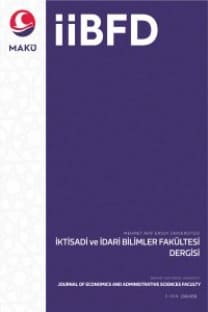İKİLİ UZUN HAFIZADA ASİMETRİ ETKİSİ: BİST BANKA ÖRNEĞİ
Etkin Piyasa Hipotezi, Bankacılık Sektörü, İkili Uzun Hafıza, ARFIMA-FIGARCH, ARFIMA-FIEGARCH, Volatilite
ASYMMETRY EFFECT IN DUAL LONG MEMORY: BIST BANK CASE
Efficient Market Hypothesis, Banking Sector, Dual Long Memory, ARFIMA-FIGARCH, ARFIMA-FIEGARCH, Volatility,
___
- BAI, J., PERRON, P. (1998), Estimating and Testing Linear Models with Multiple Structural Changes, Econometrica, 66, 47-78.
- BAI, J., PERRON, P. (2003), Computation and Analysis of Multiple Structural Change Models, Journal of Applied Econometrics, 18, 1-22.
- BAILLIE, R. T., BOLLERSLEV, T. ve MIKKELSON, H. O. (1996), Fractionally Integrated Generalized Autoregressive Conditional Heteroskedasticity, Journal of Econometrics, 74(1), 3-30.
- BAILLIE, R. T. (1996), Long Memory Process And The Fractional Integration In Econometrics, Journal of Econometrics, 73, 5-59.
- BOLLERSLEV, T. (1986), Generalized Autoregressive Conditional Heteroscedasticity, Journal of Econometrics, 31(3), 307-327.
- BOLLERSLEV, T., MIKKELSEN, H. O., (1996), Modelling And Pricing Long Memory in Stock Market Volatility, J Economic, 73, 151–184.
- BREALEY, R. A., MYERS, S. C., (2003), Principles of Corporate Finance, NewYork: McGraw Hill Companies.
- ÇEVİK, E. İ. (2012), İstanbul Menkul Kıymetler Borsası’nda Etkin Piyasa Hipotezinin Uzun Hafıza Modelleri İle Analizi: Sektörel Bazda Bir İnceleme, Yaşar Üniversitesi E-Dergisi, 7(26), 4437-4454.
- ÇEVİK, E. İ., ERDOĞAN, S. (2009), Bankacılık Sektörü Hisse Senedi Piyasasının Etkinliği: Yapısal Kırılma ve Güçlü Hafıza, Doğuş Üniversitesi Dergisi, 10(1), 26-40.
- ELDER, J., SERLETIS, A. (2007), On Fractional Integrating Dynamics in The US Stock Market, Chaos, Solitons and Fractals, 34(3),777-781.
- ENGLE, R. F. (1982), Autoregressive Conditional Heteroscedasticity with Estimates of The Variance of United Kingdom Inflation. Econometrica, 50 (4), 987-1007.
- EOMA, C., CHOI, S., OH, G. ve JUNG, W.S. (2008), Hurst Exponent and Prediction Based On Weak-Form Efficient Market Hypothesis of Stock Markets, Physica A, 387, 4630-4636.
- FAMA, E. F., (1970), Efficient Capital Markets: A Review of Theory and Empirical Works, Journal of Finance, 25(2), 383-417.
- GEWEKE, J., PORTER-HUDAK, S. (1983), The Estimation And Application Of Long Memory Time Series Models, Journal of Time Series Analysis, 4, 221-238.
- GRANGER, C. W. J. (1980), Long Memory Relationships and The Aggregation of Dynamic Models, Journal of Econometrics, 14 (2), 227-238.
- GRANGER, C. W. J., JOYEUX, R. (1980), An Introduction to long memory time series models and fractional differencing, Journal of Time Series Analysis, 1(1), 15-29.
- HOSKING, J. R. M. (1981), Fractional Differencing, Biometrica, 68(1), 165-176.
- INCLAN, C., TIAO, G. C. (1994), Use of Cumulative Sums of Squares for Retrospective Detection of Changes of Variance, Journal of the American Statistical Association, 89(427), 913-923.
- KILIÇ, R. (2004), On The Long Memory Properties of Emergingcapital Markets: Evidence From Istanbul Stock Exchange, Applied Financial Economics, 14, 915–922.
- KORKMAZ, T., ÇEVİK, E. İ. ve ÖZATAÇ, N. (2009), Testing for Long Memory in ISE Using ARFIMA-FIGARCH Model And Structural Break Test, International Research Journal of Finance and Economics, 26, 186-191.
- LO, A. W. (1991), Long-Term Memory in Stock Market Prices, Econometrica, 59(5), 1279-1313.
- LUX, T., KAIZOJI, T. (2007), Forecasting Volatility and Volume in The Tokyo Stock Market: Long Memory, Fractality And Regime Switching, Journal of Economic Dynamics ve Control, 31(6), 1808-1843.
- MAHESHCHANDRA, J. P. (2012), Long Memory Property in Return And Volatility: Evidence From The Indian Stock Markets, Asian Journal of Finance & Accounting, 4(2), 218-230.
- MCMILLAN, D. G., THUPAYAGALE, P. (2008), Efficiency of The South African Equity Market, Applied Financial Economics Letters, 4(5), 327-330.
- MUN, H.W., SUNDARAM, L. ve YIN, O.S. (2008), Leverage Effect And Market Efficiency of Kuala Lumpur Composite Index, International Journal of Business and Management, 3(4),138-144.
- NELSON, D. B. (1991), Conditional Heteroskedasticity İn Asset Returns: A New Approach, Econometrica, 59(2), 347-370.
- PHILLIPS, P.C.B. (1999a), Discrete Fourier Transforms of Fractional Processes. Unpublished Working Paper, 1243, Cowles Foundation For Research in Economics, 18.05.2018 tarihinde Yale Üniversitesi: http://Cowles.Econ.Yale.Edu/P/ Cd/D12a/D1243.pdf adresinden alındı.
- PHILLIPS, P.C.B. (1999b), Unit Root Log-Periodogram Regression. Unpublished Working Paper, No. 1244, Cowles Foundation For Research in Economics, 18.05.2018 tarihinde Yale Üniversitesi: http://Cowles.Econ.Yale.Edu/P/Cd/D12a/D1244.pdf adresinden alındı.
- ROBINSON, P.M. (1995), Log-Periodogram Regression of Time Series With Long Range Dependence, Annals Of Statistics, 23, 1048-1072.
- SANSO, A., ARAGO, V. and CARRION, J. L., (2004), Testing For Changes in the Unconditional Variance of Financial Time Series, Revista de Economİa Financiera,1-24.TURGUTLU, E. (2004), Fisher Hipotezinin Tutarlılığının Testi: Parçalı Durağanlık Ve Parçalı Koentegrasyon Analizi, DEÜ İİBF Dergisi, 19(2), 55-75.
- TÜRKYILMAZ, S., BALIBEY, M. (2014), Türkiye Hisse Senedi Piyasası Getiri Ve Oynaklığındaki Uzun Dönem Bağımlılık İçin Ampirik Bir Analiz, DEÜ Sosyal Bilimler Enstitüsü Dergisi, 16(2), 281-302.
- URAL, C., KÜÇÜKÖZMEN, C. (2011), Analyzing The Dual Long Memory in Stock Market Returns, Ege Academic Review, 11 (Özel Sayı), 19-28.
- ISSN: 2149-1658
- Yayın Aralığı: Yılda 3 Sayı
- Yayıncı: Mehmet Akif Ersoy Üniversitesi İktisadi ve İdari Bilimler Fakültesi
AMERİKAN SİYASET BİLİMİNİN İDEOLOJİK İŞLEVSELLİĞİ: SİYASAL GELİŞME KAVRAYIŞI
İŞ TATMİNİ VE ETİK İKLİM PERSPEKTİFİNDEN ÖĞRETMENLER ÖZELİNDE BİR ARAŞTIRMA
NOSTALJİ EĞİLİMİNİN TÜKETİCİ TEMELLİ MARKA DEĞERİ ÜZERİNE ETKİSİ: DOĞU EKSPRESİ ÜZERİNE BİR ÇALIŞMA
Alpaslan YÜCE, Çağlar SAMSA, Kamile MERİÇ
TÜRKİYE’DE YENİLENEBİLİR ENERJİ TÜKETİMİNİN EKONOMİK BÜYÜME ÜZERİNDEKİ ASİMETRİK ETKİLERİ
Şükrü APAYDIN, Afşin GÜNGÖR, Celal TAŞDOĞAN
İKİLİ UZUN HAFIZADA ASİMETRİ ETKİSİ: BİST BANKA ÖRNEĞİ
SERMAYE AKIŞI VE EKONOMİK BÜYÜME İLİŞKİSİ: ASİMETRİK ETKİLER
Seher Gülşah TOPUZ, Taner SEKMEN
KAR PAYI DAĞITIM POLİTİKALARININ FİRMA DEĞERİ ÜZERİNE ETKİSİ: BİST 30 ENDEKSİ ÜZERİNE BİR ARAŞTIRMA
DUYGUSAL EMEK, SATIŞ GÖRÜŞMESİ KAYGISI VE İŞ PERFORMANSI İLİŞKİSİ ÜZERİNE GÖRGÜL BİR ÇALIŞMA
Metin REYHANOGLU, Betül BALIKÇIOĞLU
KUZEY IRAK’TA TARIM SEKTÖRÜNDE DOĞRUDAN YABANCI SERMAYE YATIRIMLARININ DEĞERLENDİRİLMESİ
